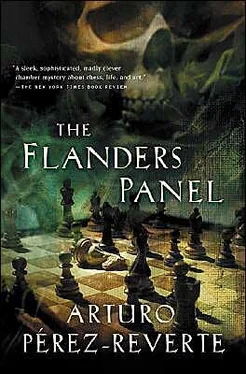“Very.” She’d noted everything down and was now taking stock. After a moment, she pushed her hair back and looked at Alvaro curiously: “Anyone would think you’d had it all prepared. I’m positively dazzled.”
The professor’s smile faded a little, and he avoided Julia’s eyes. One of the cards on his desk seemed suddenly to require his attention.
“It’s my job,” he said. And she couldn’t tell if his tone was simply distracted or evasive. Without quite knowing why, this made her feel vaguely uncomfortable.
“Well, all I can say is, you’re still extremely good at it.” She observed him with interest before returning to her notes. “We’ve got plenty of references to the painter and to two of the people in the painting.” She leaned over the reproduction and placed a finger on the second player. “But nothing about him.”
Alvaro was busy filling his pipe and didn’t reply at once. He was frowning.
“It’s difficult to say with any exactitude,” he said between puffs. “The inscription RUTGIER AR. PREUX isn’t very explicit. Although it’s enough to come up with an hypothesis.” He paused and stared at the bowl of his pipe as if hoping to find in it confirmation of his idea. “Rurgier could be Roger, Rogelio, Ruggiero, all of them possible forms – and there are at least ten variants – of a name common at the time. Preux could be a surname or a family name, in which case we’d come to a dead end, because there’s no mention of any Preux whose deeds would have merited an entry in the chronicles. However, preux was also used in the high Middle Ages as an honorific adjective, even as a noun, with the sense of ‘valiant’, ”chivalrous‘. The word is applied to Lancelot and Roland, to give you but two famous examples. In France and England, they would use the formula ’soyez preux‘ when knighting someone, that is, “be loyal or brave’. It was a very exclusive title, used to distinguish the crime de la crime of the knighthood.”
Unconsciously, out of professional habit, Alvaro had adopted the persuasive, almost pedagogical tone that he tended to slip into sooner or later whenever a conversation touched on aspects of his speciality. Julia noticed it with some alarm; it stirred up old memories, the forgotten embers of an affection that had occupied a place in time and space and in the formation of her character as it was now. The residue of another life and other feelings that a relentless war of attrition had succeeded in deadening and displacing, the way you relegate a book to a shelf to gather dust, with no intention of ever opening it again, but which is still there, despite everything.
Confronted by such feelings, she knew that she had to resort to other tactics: keep her mind on the matter in hand; talk, ask for further details, whether she needed to know them or not; lean over the desk, pretending to concentrate hard on taking notes; imagine she was standing before a different Alvaro, which, of course, she was; act, feel, as if the memories belonged not to them, but to two other people someone had once mentioned to her and whose fate was a matter of indifference.
Another solution was to light a cigarette, and Julia did so. The smoke filling her lungs helped reconcile her and lend her a small measure of detachment. She looked at Alvaro, ready to continue.
“What’s your hypothesis then?” Her voice sounded quite normal and that made her feel much calmer. “As I see it, if Preux wasn’t the surname, then the key might lie in the abbreviation AR.”
Alvaro nodded. Half-closing his eyes against the smoke from his pipe, he leafed through the pages of another book until he found a name.
“Look at this. Roger de Arras, born in 1431, the same year in which the English burned Joan of Arc at the stake in Rouen. His family were related to the Valois, the reigning dynasty in France at the time, and he was born in the castle of Bellesang, very near the duchy of Ostenburg.”
“Could he be the second chess player?”
“Possibly. AR would be exactly right for the abbreviation of Arras. And Roger de Arras appears in all the chronicles of the time. He fought in the Hundred Years’ War alongside the King of France, Charles VII. See? He took part in the conquest of Normandy and Guyenne to win them back from the English. In 1450 he fought in the battle of Formigny and three years later at the battle of Castillon. Look at this engraving. He might well be one of those men; perhaps he’s the knight with his visor down, offering his horse in the midst of the fray to the King of France, whose own horse has been killed, but who continues to fight on foot…”
“You amaze me, Professor,” Julia said, looking at him with open astonishment. “I mean that picturesque image of the warrior in the battle. You were the one who always said that imagination is the cancer of historical rigour.”
Alvaro burst out laughing.
“Consider it poetic licence, in your honour. How could I forget your fondness for going beyond the mere facts? I recall that when you and I…”
He fell silent, suddenly uncertain. His allusion to the past had caused Julia’s face to darken. Recognising that memories were out of place just then, Alvaro hurriedly back-pedalled.
“I’m sorry,” he said in a low voice.
“It doesn’t matter,” Julia replied, briskly stubbing out her cigarette in the ashtray and burning her fingers in the process. “It was my fault really” She looked at him more calmly. “So what have you got on our warrior, then?”
With visible relief, Alvaro plunged back into familiar terrain. Roger de Arras, he explained, had not only been a warrior, he’d been many other things besides. For example, he was a model of chivalry, the perfect medieval nobleman. In his spare time he’d been a poet and musician. He was much admired in the court of the Valois, his cousins. So the word “preux” fitted him like a glove.
“Did he have any links with chess?”
“There’s no mention of any.”
Julia was taking notes, caught up in the story, but she stopped suddenly and looked at Alvaro.
“What I don’t understand,” she said, chewing the end of her pen, “is what this Roger de Arras would be doing in a picture by Van Huys, playing chess with the Duke of Ostenburg.”
Alvaro fidgeted in his seat with apparent embarrassment, as if suddenly gripped by doubt. He sucked on his pipe and stared at the wall behind Julia’s head, with the air of someone waging an inner battle. Finally, he managed a cautious smile.
“I’ve no idea what he’s doing there – apart from playing chess, that is.” Julia was sure that he was looking at her with unusual wariness, as if he could not quite put into words an idea that was going round and round in his head. “What I do know,” he added at last, “and I know this because it’s mentioned in all the books on the subject, is that Roger de Arras didn’t die in France, but in Ostenburg.” After a slight hesitation, he pointed to the photograph of the painting. “Have you noticed the date of this painting?”
Puzzled, Julia said: “Yes, 1471. Why?”
Alvaro slowly exhaled some smoke and uttered something that sounded like an abrupt laugh. He was looking at Julia as if trying to read in her eyes the answer to a question he could not quite bring himself to ask.
“There’s something not quite right there,” he said finally. “That date is either incorrect or the chronicles are lying, or else that knight is not the Rutgier Ar. Preux of the painting.” He picked up a mimeographed copy of the Chronicle of the Dukes of Ostenburg and, after leafing through it for a while, placed it in front of her. “This was written at the end of the fifteenth century by Guichard de Hainaut, a Frenchman and a contemporary of the events he describes, and it is based on eyewitness accounts. According to Hainaut, our man died at Epiphany in 1469, two years before Pieter Van Huys painted The Game of Chess. Do you understand, Julia? Roger de Arras could never have posed for that picture, because by the time it was painted, he was already dead.”
Читать дальше












